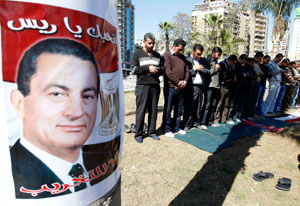It was discomfiting, in recent days, to have Israel and, specifically, Prime Minister Benjamin Netanyahu, portrayed as shareholders in Mubarak, Inc., and to see the ex-ruler described as Israel's ally. Actually, the originator of the thesis that Arab dictatorships could promote peace was none other than Yitzhak Rabin, who argued that Arab strongmen could rein in terrorism more efficiently than Israel.
They didn't have to contend with judicial intervention and human rights meddlers. Arab leaders, treated with indulgence because, after all, boys will be boys, could employ the requisite brutality against terrorism in their countries, while the enlightened world would be aghast at far less repressive tactics employed by Israel.
 |
| Supporters of former Egyptian President Hosni Mubarak pray outside Moustafa Mahmoud Mosque in Mohandessin neighborhood in Cairo February 18, 2011. Reuters |
This mode of thinking is perpetuated by opinion leaders who beseech Israel to make peace with the even more oppressive Syrian hereditary republic of the Assad clan. I fully subscribe to Prof. Efraim Karsh's assessment of Mubarak: "He [Mubarak] has also fostered a culture of virulent anti-Semitism in Egypt, a culture whose premises he himself evidently shares."
Writing in Commentary Magazine in April 2002, the historian cited a passage from Mubarak's speech to students at Cairo University in 1991, in which he gloated over Egypt's victory at Camp David: "Against us stood the most intelligent people on earth - a people that controls the international press, the world economy and world finances. We succeeded in compelling the Jews to do what we wanted; we received all our land back, up to the last grain of sand! We have outwitted them, and what have we given them in return? A piece of paper ... We have established sophisticated machinery to control and limit to the minimum contacts with the Jews."
Under that system, Israeli leaders would visit Egypt, but Mubarak, with the exception of Rabin's funeral in 1995, never reciprocated. The resident Egyptian ambassador was embraced by Israel's social set; Israel's ambassador to Cairo was treated as a diplomatic leper. Egyptian intellectuals who explored ties with Israel were visited by Mubarak's Mukhabarat - a serious disincentive to continued contacts.
Egypt used every international forum to condemn Israel, and allowed anti-Semitism to flourish in the local press and in government-controlled media, as per the recent charge that Israeli GPS-guided sharks were working to destabilize Egyptian tourism. When occasionally pressed on the matter of incitement, Mubarak would disingenuously argue that his country had a free press.
I shed no tears for Mubarak, but I have a disagreement with supporters of his overthrow who contend that Israel had no right to be alarmed about a worse alternative, or, like British Foreign Secretary William Hague, lecture us about lowering our belligerence when warning of such an alternative, or about how this is not about Israel.
James Traub, writing in Foreign Policy ?(February 10?), attempted to whitewash the Muslim Brotherhood, though he acknowledged: "The Brothers with whom I spoke were not only anti-Israel, but pro-Hamas. Israel has every reason to fear the prospect of a Muslim Brotherhood government."
Traub, however, argued that the United States and Israel cannot "stand athwart history shouting, 'Stop!' The only possible answer is to accept the legitimate aspirations of the Palestinian people for a state of their own."
Egypt's government is an internal Egyptian matter. Israel merely expects that any such government honour the treaty obligations of its predecessor, as pacta sunt servanda ?(agreements must be kept?) is a cornerstone of international law and stable international relations.
The peace with Israel was, as Mubarak correctly acknowledged, the cut-rate price that Egypt paid to get Israel to cede the Sinai and destroy the thriving communities of the Yamit district. Israel signed this one-sided treaty because of peace millenarianism and the pressure applied by that dishonest broker Jimmy Carter, who, as former National Security Council official William Quandt revealed, secretly ganged up on Israel with Egypt. The treaty was the greatest disaster of Menachem Begin's premiership, but at least, as political scientist Dore Gold has pointed out, Begin insisted that the treaty, by way of Article 6, stand on its own, regardless of external events.
We do not fear Egyptian democracy; we fear people like Traub, who believe that Israel and its interests are dispensable for the "greater good," such as Egyptian democracy, and who, when pushed to the wall, are ready to exonerate Egypt's treaty abrogation because Israel insists on certain minimal conditions for Palestinian statehood. By Traub's logic, if the Palestinians had accepted Ehud Barak's or Ehud Olmert's delusional peace offerings in 2000 and 2008, they would be entitled to revoke the deal if they were dissatisfied with the treatment of Arabs in what would be left of Israel - say, in Jaffa or Nazareth.
Mubarak has left a toxic legacy. Even the most competent, altruistic Egyptian government will have to cope with major problems, most notably overpopulation and job creation for a swollen youth cohort. Job creation is no easy matter - ask Barack Obama - particularly for the young, as Jose Zapatero and Nicolas Sarkozy will attest to. I don't suppose that The New York Times' Thomas L. Friedman, with his enthusiasm for things Chinese, will recommend that Egypt, a la China, limit families to one child.
Faced with these difficulties, it will be far easier for an Egyptian leader to blame the Jews. Israel, in its yearning for peace precipitation, has wrongly resigned itself to such spittle, but it does insist that both sides honour the peace.
Otherwise, be kind enough to return the Sinai.
Courtesy Haaretz, Israel
Dr. Amiel Ungar, a political scientist, is a regular contributor to Haaretz English Edition. |


